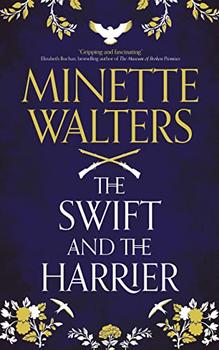Summary | Excerpt | Reviews | Beyond the Book | Readalikes | Genres & Themes | Author Bio

1642
The English Civil War begins on 22 August when
King Charles raises his standard at Nottingham.
Three days earlier, a Catholic priest is executed
in Dorset for treason.
ONE
DORCHESTER, DORSET, 19 AUGUST 1642
As the hour for the priests' execution approached, the press of people heading for Gallows Hill grew denser and more impatient. Jayne Swift had expected crowds, but not such a multitude as this. It seemed every Puritan in Dorset had come to gloat at the spectacle of Catholics being hanged, drawn, and quartered, because there wasn't a road or street in Dorchester that wasn't thronged with hard-faced men and women, their eyes aglitter in anticipation of papist blood being spilt.
Jayne's only means of making headway against the tide was to stay close to the fronts of houses and try to move forward each time there was a gap, but she was attracting unwelcome attention by doing so. She made the decision to retreat into a doorway and wait for the crush to subside after a man rounded on her angrily for knocking against him. She raised her hands in apology, but the suspicion in his eyes as he studied her gown alarmed her. She lowered her head submissively to prevent confrontation and sighed with relief when his wife and the flow of humanity carried him on towards Gallows Hill.
The embrasure was deep enough for her to withdraw into the corner where the door was hinged to the wall, allowing her to avoid further curiosity by facing the way the people were walking. All were dressed in the drab uniform of Puritanism—simple dark clothes with plain white collars and, in the case of women, tight-fitting bonnets and starched aprons—and Jayne wondered whether it was fear of being thought less righteous than their neighbors or sincere belief that Catholicism was evil that had brought them to the executions. She hoped it was fear, for she struggled to accept that tolerance of other religions was entirely dead in Dorset.
The two priests slated for evisceration that day had been arrested by a customs officer five months earlier when they boarded a ship for France in Lyme harbor. Since then, they had languished in Dorchester jail, awaiting trial and inevitable sentencing. Yet their crime was not that they were Catholic. Rather, they had been convicted of treason for taking a ship too late to obey the King's edict that all priests must leave the country by the tenth of April, and it mattered not that neither had seen the writ or knew the required date of departure.
Had Jayne felt any animosity towards Ruth, she would have cursed her cousin for summoning her at such an inopportune time; but since she did not, she pressed herself deeper into the embrasure and prepared to wait for the crowd to thin. All might have been well had the door not opened behind her to reveal a thin-lipped matriarch of some sixty years, clad in unforgiving black, who was clearly affronted to find a young woman loitering on her step, particularly one as tall as Jayne, who overtopped her by a good four inches.
She ran a critical gaze over Jayne's apparel, lingering on the lace trim around her bonnet and apron, and the slashes in her sleeves which revealed pale green silk beneath the dark blue of her tailored gown. It was hard to say if she was being taken for a trollop or a Royalist sympathizer because, under close inspection, none of Jayne's garments could pass as "plain" and "unadorned," in the Puritan style; though glimpsed at a distance in the streets of Dorchester, they usually escaped notice. With a smile of apology, she adjusted the strap of her heavy leather satchel, which she wore across her shoulders, and made ready to set off again.
She was prevented from leaving by a surprisingly firm hand gripping her right wrist. "You have a crest embossed on the flap of your bag. Name it for me, please."
From The Swift and the Harrier by Minette Walters. Used with the permission of the publisher, Blackstone Publishing. Copyright ©2022 by Minette Walters.
A few books well chosen, and well made use of, will be more profitable than a great confused Alexandrian library.
Click Here to find out who said this, as well as discovering other famous literary quotes!
Your guide toexceptional books
BookBrowse seeks out and recommends the best in contemporary fiction and nonfiction—books that not only engage and entertain but also deepen our understanding of ourselves and the world around us.